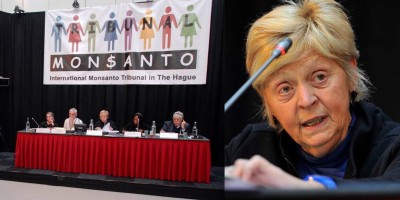Monsanto Tribunal: Five Renowned Judges Hear Witnesses Describe Crimes Against Humanity

Last weekend, farmers, scientists and activists from all over the world gathered at the Monsanto Tribunal in The Hague, Netherlands, to present the case against destruction caused by one of the corporate giants that promotes industrial farming.
The symbolic Monsanto Tribunal aimed to hold Monsanto—the giant agrochemical company—to account for its alleged atrocities against humanity and the environment.
This event is far from over. It will echo back through the food system as the tribunal’s participants bring home lessons, solutions and renewed hope for change.

Monsanto Tribunal in The Hague on Oct. 15.Greenpeace

First day of the tribunal, judges Tulkens (left) and Dior Fall Sow.Greenpeace
Five internationally renowned judges heard 30 witnesses. Experts gave their accounts of the environmental damage wrought by Monsanto. One testimony described how monoculture has caused a great loss to seed variety. They compared the patenting of seeds to a new form of colonization.

Seng Channeang, Cambodian small-scale farmer.Greenpeace
These testimonies will give people all over the world a well-documented legal brief to be used in lawsuits against other similar corporations.
“Although this is not legally binding, it is legally sound,” said Arnaud Apoteker, member of the steering committee of the tribunal. “The witnesses were presenting real cases to real judges. The lessons from this event can be used in ensuing local battles.”
One of the 30 witnesses, Feliciano Ucam Poot, a Mayan farmer from Mexico, submitted evidence to support his allegations that glyphosate and other chemicals are linked to children’s sickness.
“Before the introduction of glyphosate and other agrochemicals, I did not see our people suffer from sickness like this,” he said. “A lot of people are suffering like us and this tribunal will ensure that our stories will be heard around the world.”

Scene from the Monsanto Tribunal Press Conference on Oct. 15.Greenpeace
Do we need these agrochemicals to feed the world? A question asked of Hans Herren, a renowned scientist and president of the Millennium Institute at the Monsanto Tribunal. “By producing less waste we can feed 10 million people. We need to make more health per acre, not calories per acre,” he said.
Running parallel to the tribunal hearings was a People’s Assembly, where people from around the world discussed solutions to the impacts caused by industrial agriculture. As many of the witnesses pointed out, one of the greatest challenges they face is to make their voices heard. This assembly provided a much needed forum for communities to come together and find sustainable solutions to common problems.

The People’s Assembly, The Hague.Greenpeace
“We should fight for ourselves. Nobody is free from danger if our food is toxic,” said Farida Akhter of UBINIG (Policy Research for Development Alternatives), Bangladesh.
The stories of people like Feliciano and the concerns of Farida are echoed by millions of voices from across the world; from beekeepers in Mexico to small scale producers in France and farmers in India.
The judges of the tribunal will assess these allegations, examine all evidence put forth and publish their findings in December.

Judges at the Monsanto Tribunal.Greenpeace
These issues aren’t limited to farmers and environmentalists—they concern us all. We all have a choice: As citizens and consumers, we can all make decisions to shape the future we want.
Here are 12 things you can do to start the eco-food revolution.
Watcharapol Daengsubha is a food and ecological agriculture campaigner with Greenpeace Southeast Asia.

